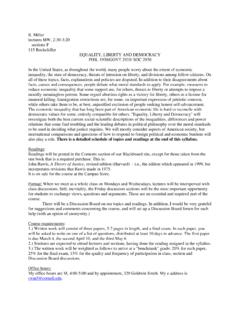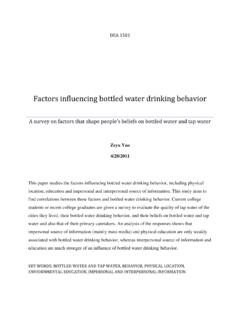Transcription of 1. Introduction - courses.cit.cornell.edu
1 islamic finance in Multicultural Indonesia Thomas B. Pepinsky Assistant Professor of Government Cornell University 1. Introduction In this essay I consider the case for islamic finance in multicultural Indonesia. I argue that as both a normative good and as a practical matter, the continued development of an islamic financial system that operates in parallel with the conventional financial system is desirable. While I accept the arguments made by several prominent Muslim critics of islamic banking, which question philosophical consistency of islamic finance as practiced in modern economies, I reject their conclusions that islamic banking as currently practiced should therefore either be eliminated or dramatically reformed. Rather, I maintain that if their arguments are actually true, then the Indonesian state should continue to provide islamic financial services for consumers who demand them.
2 That is, if islamic financial products truly are indistinguishable from conventional financial products, then the only costs in offering them are the costs of financial engineering ( which will approach zero over time) and of regulation. Meanwhile, if some pious Muslims in Indonesia demand sharia-compliant products, then offering them allows these consumers to enter the market. Doing so improves the financial market s distributional efficiency, and provides opportunities for these individuals to obtain mortgages, business loans, and other financial products. Indonesia is a country with approximately 200 million Muslim citizens, and while most appear unconcerned with sharia-compliance in their financial products, some are. So long as islamic finance does not threaten the conventional financial system, the 2 Indonesian state should continue with the steps that it has taken to accommodate these islamic finance in the Indonesian economy.
3 I begin with an analogy. Automobile manufacturers have long recognized that some consumers demand prestige goods, goods whose prices are purposefully marked up to reflect the desirability of a particular brand name. In the United States, Ford sells cars under the Mercury brand, inflating the price far beyond that which corresponds with a higher grade of leather or gold plated electronics. They do this because some automobile purchasers wish to buy a prestige brand and are willing to pay these inflated prices. An islamic financial market that parallels the conventional financial market is quite similar. islamic financial engineers produce financial products that are almost identical to conventional financial products, the difference being certain technical details (which I outline below) that are deemed by many islamic scholars to fulfill Islam s injunction against the collection of interest.
4 islamic financial products frequently cost the same or perhaps slightly more than conventional products. Yet some Muslims prefer to purchase them because they believe that they are fulfilling a spiritual dictum to avoid prohibited transactions. No one would impugn an automobile manufacturer for recognizing an opportunity for profit by offering prestige brands. Likewise, I argue, no one should impugn an islamic financial engineer for recognizing an untapped market segment. Two prominent observers of islamic economics, Timur Kuran (2004) and Mahmoud El-Gamal (2006), have criticized islamic finance for violating the social intent of islamic injunctions against interest. Yet I see this as nothing more than criticizing an automobile manufacturer for taking advantage of the demand for prestige products.
5 We may find their motives odious and exploitative, but there is nothing ethnically improper with matching demand with supply in a voluntary manner. And in fact, I 3 argue that inasmuch as some pious Indonesian Muslims might actually refuse to participate in the formal economy without the option of purchasing islamic financial products, it is normatively desirable to make these products available. In the next section I propose a political lens through which to understand modern banking systems in general, and islamic banking in particular. I argue that banking systems both conventional and islamic are by necessity centralized and state-controlled political institutions. This creates a tension in countries like Indonesia between the demands of ordinary citizens for specialized, variegated financial products, and the state s need to centralize and regulate a national financial system.
6 I then describe islamic banking in Indonesia, and detail how islamic finance differs in a theoretical manner from conventional finance , concluding that there are few differences between islamic finance and conventional finance . Next, I entertain three objections to islamic finance , and argue that together they are not sufficient to give the state any reason not to facilitate the development of islamic finance in Indonesia. Importantly, I support this argument with empirical evidence, introducing results from the first survey ever taken of Indonesian citizens regarding their views of islamic finance . 2. The State and finance There is no aspect of a national financial system where that is independent from political influence. From monetary policy goals to the choice of monetary institutions, political considerations lie at the heart of modern finance (Kirshner 2003).
7 At the center of every modern financial system are a central bank and monetary authorities that give order to what would otherwise be a chaotic system of independent and unregulated private financiers. These organized national financial systems do not arise spontaneously, but rather require a state to enact the legislation that creates them. The laws that allow for the creation of national financial 4 systems also govern the policy goals and the degree of political autonomy enjoyed by financial policy authorities. As the types of financial transactions that may take place require at least tacit permission from monetary authorities, they depend as well on the state s willingness to tolerate them. In the same way that national financial systems do not arise absent a state to create them, islamic financial systems do not emerge spontaneously either.
8 Instead, they require enabling legislation and regulatory institutions, each of which again are necessarily provided by the state. islamic principles, discussed below, require financial products that do not neatly fit within standard financial regulatory practices (Errico and Farakbash 1998). Banking systems that forbid the collection of interest, for example, may be incompatible with the standard ways that central banks regulate commercial banks through statutory reserve requirements and interest bearing accounts in the central bank. Without interest, furthermore, it is unclear how banks play their central role in the transmission of monetary policy. In multicultural countries such as Indonesia, where islamic banking operates in tandem with a conventional banking system, the fact that national financial systems require centralized institutions and standardized rules creates a singular tension.
9 The state, on one hand, must centralize and regulate financial institutions to ensure their orderly function. The social costs of failing to do so are best illustrated through the breakdown of financial regulation that accompanied the Indonesian economic crisis of the late 1990s. But some citizens may demand different or even preferential financial regulations in line with their beliefs, refusing to participate in financial systems that do not conform to them. To obtain this treatment, they may turn to politics as well. The issue of islamic finance , then, provides a way to examine broader 5 tensions between the state and competing identities in this case example, secular versus pious Muslims in Indonesia. With the state playing such a central role in creating and shaping national financial systems, it is no surprise that the rise of islamic finance is intimately tied with political developments in the Muslim world.
10 islamic finance comprises only one part of a wider system of islamic economic thought. islamic economic thought, in turn, is often considered to have first been articulated in its modern form by Sayyid Abul-Ala Mawdudi, a political activist and economic thinker from modern-day India whose most influential writings date from the 1930s and 1940s (see Kuran 1997). Writing in the context of British decolonization and the debate over Indian partition, Mawdudi argued that Muslims should strive to conceive of Islam as not just a religion, but a way of life in explicit contrast to the secular worldview predominant in Europe and North America. More than simply advocating reform and renewal, however, Mawdudi joined several other scholars in advocating concrete policy reforms to guide such as a society.



















